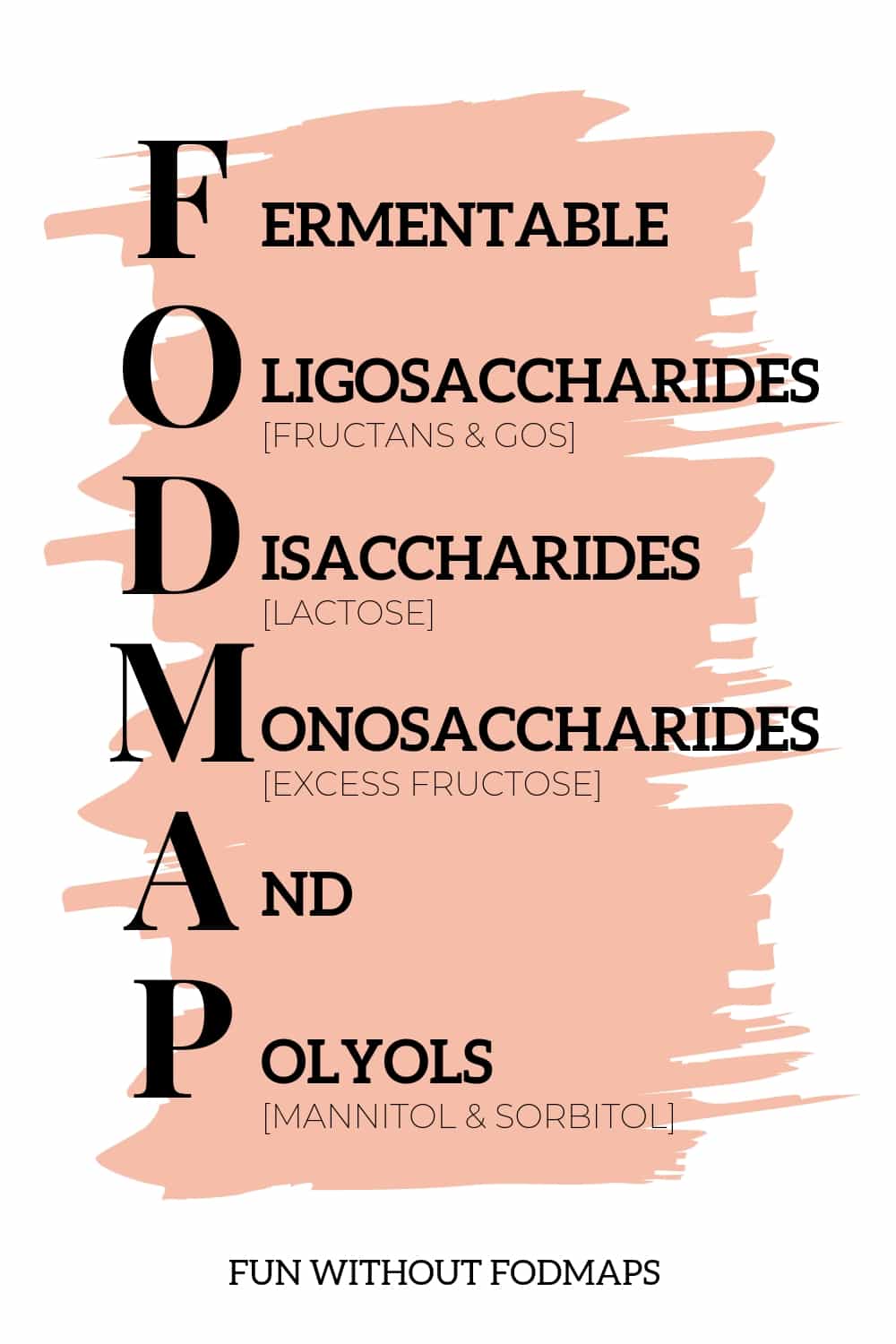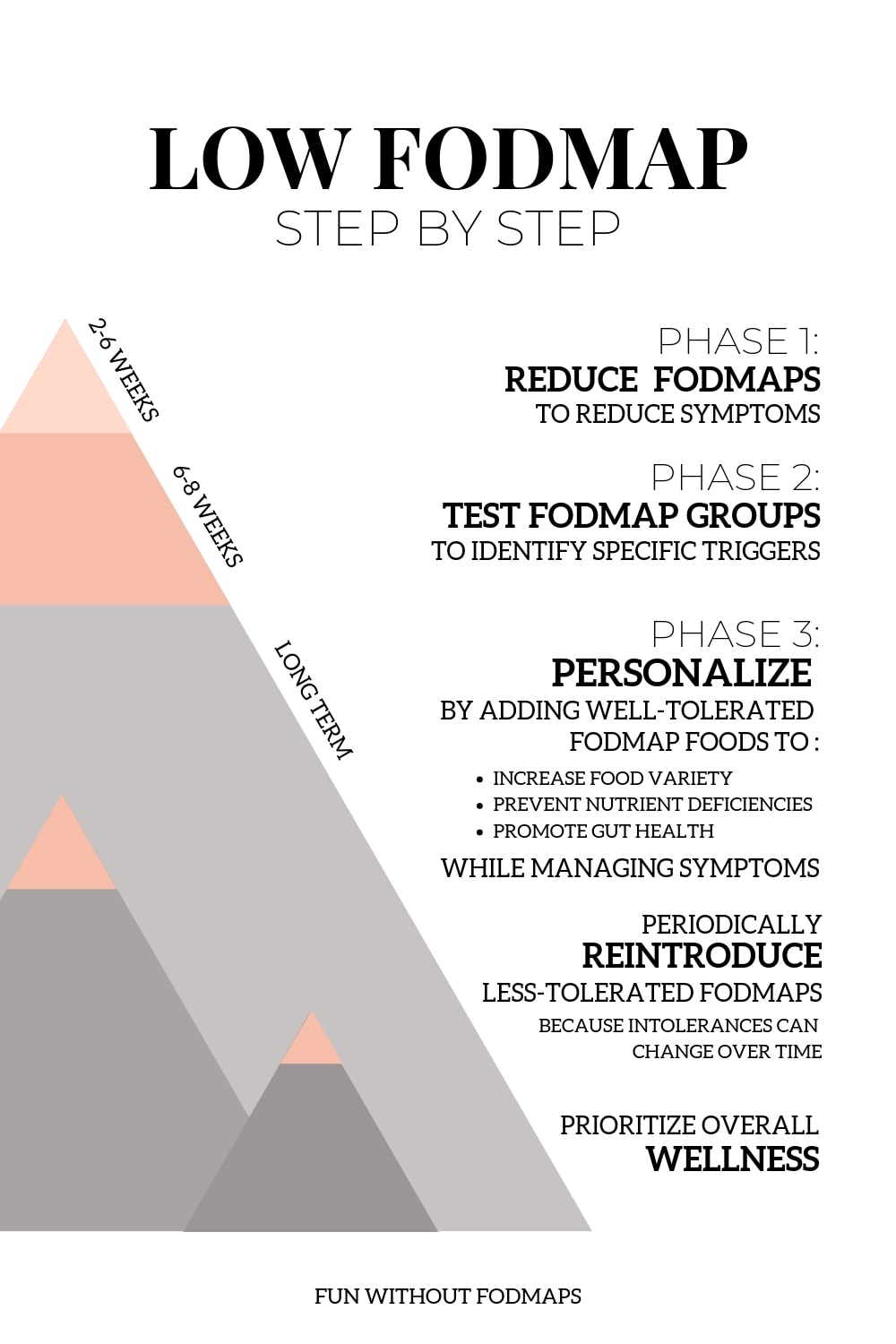
Reducing FODMAPs (certain types of carbohydrates) can help many of us with irritable bowel syndrome (IBS) manage digestive symptoms.
But what really is a FODMAP? How do FODMAPs impact my IBS symptoms? Where do I start? Continue reading for answers to these and other frequently asked questions.
What is a FODMAP?
FODMAP is an acronym for:
- Fermentable
- Oligosaccharides (fructan & GOS)
- Disaccharides (lactose)
- Monosaccharides (excess fructose)
- And
- Polyols (mannitol & sorbitol)
FODMAPs are certain types of carbohydrates (or “carbs”) that are:
- Not well absorbed in our small intestine.
- Rapidly fermented by bacteria living in our large intestine
How do FODMAPS relate to IBS symptoms?
IBS is complex and individual. Research supports FODMAPs playing a significant role in IBS symptoms. FODMAPs appear to be dose-dependent, meaning
FODMAPs and IBS-related diarrhea
FODMAPs are poorly absorbed, or not able to be used as fuel, for a couple of reasons:
- Our bodies lack the enzymes (think: scissors) needed to cut FODMAPs down into usable pieces. Relevant FODMAPs: fructan, GOS, & lactose
- Too many FODMAPs at one time can overload the transporters or channels (think: tools) our bodies use to absorb them. When this happens, not all of the FODMAPs can be absorbed. Relevant FODMAPs: polyols & excess fructose
Large amounts of poorly absorbed FODMAPs create a temporary imbalance that our body tries to correct by pulling water into the intestines. Researchers believe this excess water in the intestines contributes to IBS-related diarrhea.
FODMAPs, IBS-related constipation, and other IBS symptoms
FODMAPs not absorbed in the small intestine move into the large intestine where our gut bacteria naturally live. Gut bacteria love FODMAPs and rapidly ferment (think: eat or use) these unabsorbed FODMAPs and produce gases.
Researchers believe these gases play a role in IBS-related constipation, as well as other IBS symptoms like bloating, distention, abdominal pain, and excessive flatulence.
If you’re interested in learning more about the science behind specific FODMAPs and their relation to IBS symptoms, I recommend starting with this review article by Wang, Camilleri, Vanner, & Tuck.

What is the Low FODMAP Diet?
The low FODMAP diet is a science-backed nutrition approach used to help some people with IBS manage symptoms. It was created by the team of gastroenterologists, dietitians, and researchers at Monash University. The traditional low FODMAP diet is generally broken into three phases:
- Reduction Phase: Reduce FODMAP intake to see if IBS symptoms improve; lasts no longer than 2-6 weeks
- Reintroduction Phase: Test each FODMAP group one at a time to determine unique tolerance levels
- Personalization Phase: Well-tolerated FODMAPs are reintroduced to increase food variety while maintaining good symptom control; retest less tolerated FODMAPs periodically.
Where are FODMAPs found?
FODMAPs are found in a variety of foods spanning across all food groups. Here are some examples of foods containing higher amounts of FODMAPs:
- Lactose: Milk, ice cream, yogurt, etc.
- Excess Fructose: Honey, high fructose corn syrup, asparagus, sugar snap peas, watermelon, apples, pears, etc.
- GOS: Beans, legumes, silken tofu, etc.
- Fructans: Garlic, onions, wheat, rye, beets, grapefruit, Brussels sprouts, etc.
- Polyols: Peaches, nectarines, blackberries, avocado, mushrooms, cauliflower, celery, sweet potato, apples, pears, some sugar-free products, etc.
How do I get started?
Start by seeing your doctor for an IBS diagnosis.
It is important to get a clear diagnosis before proceeding. IBS and other digestive conditions can have similar symptoms but need very different management strategies. Celiac disease should also be ruled out before starting the low FODMAP diet.
Find a trained dietitian, if possible.
Try to find a gastrointestinal (GI) or FODMAP-trained dietitian to support your IBS journey. Dietitians can help you prevent nutrient deficiencies, troubleshoot lingering symptoms, and interpret reintroduction results.
With that said, I recognize accessibility is
Download the Monash FODMAP App
This is the only FODMAP diet app that I consistently recommend. The Monash FODMAP team created the low FODMAP diet and continue to be at the forefront of FODMAP and IBS research. The app has the largest and most reliable database of FODMAP food information. It costs about $10 which helps to fund further research and testing of foods.
Disclaimer: The information included on FUN WITHOUT FODMAPS is intended for education and enjoyment purposes only. Information provided on this website is not a substitute for professional medical advice, diagnosis or treatment. Always seek the advice of your physician or other qualified health care provider before altering your diet, changing your exercise regimen, starting any new lifestyle changes or modifying an existing treatment plan.
76

Leave a Reply